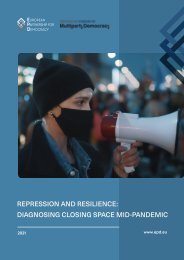Thinking Democratically: A Comprehensive Approach to Countering and Preventing Shrinking Space
Create successful ePaper yourself
Turn your PDF publications into a flip-book with our unique Google optimized e-Paper software.
<strong>to</strong> enforce political party compliance with existing laws <strong>and</strong> regulations, or <strong>to</strong> only sanction<br />
opposition parties. In other cases, the elec<strong>to</strong>ral management body is stripped of its sanctioning<br />
powers, or purposefully starved from funding in order <strong>to</strong> limit operations, such as the moni<strong>to</strong>ring of<br />
campaigning. The staff of elec<strong>to</strong>ral management bodies may also be a source of government control.<br />
Some examples clarify these manipulative practices. In Georgia, for instance, campaign regulations<br />
are unevenly applied, <strong>and</strong> opposition parties receive most sanctions. Similarly, in El Salvador the high<br />
voting threshold needed for officially registering as a party was not applied when the two traditional<br />
parties did not reach the threshold, whereas other parties who did not reach the threshold were not<br />
allowed <strong>to</strong> compete in elections. In Zimbabwe, the elec<strong>to</strong>ral commission is filled with former security<br />
personnel, <strong>and</strong> any regulations need <strong>to</strong> be approved by the minister of justice (from the ruling party).<br />
In Kenya, the ruling party has been delaying the enactment <strong>and</strong> implementation of the Election<br />
Campaign Financing Act of 2013 for two elec<strong>to</strong>ral cycles. In practice this has meant that the elec<strong>to</strong>ral<br />
management body has failed <strong>to</strong> sanction those political parties (including the party in power) who<br />
surpassed campaign expenditure ceilings, <strong>and</strong> the government has refused <strong>to</strong> provide the public<br />
funding <strong>to</strong> political parties required by the law. This greatly disadvantages opposition parties <strong>and</strong><br />
smaller political parties <strong>and</strong> increases the role of private money in politics.<br />
When there is no real separation of powers, the ruling party can pressure all other public authorities<br />
<strong>and</strong> administrative bodies. In Georgia, for instance, local administrations have hindered opposition<br />
parties’ efforts <strong>to</strong> meet the elec<strong>to</strong>rate by denying them access <strong>to</strong> key venues through citing various<br />
bureaucratic impediments. But it goes further than that, as ruling parties can also abuse their<br />
legislative powers <strong>to</strong> make legal changes that entrench their own dominant position, for instance<br />
through elec<strong>to</strong>ral reforms.<br />
Reforming elec<strong>to</strong>ral <strong>and</strong> party law<br />
The constitution <strong>and</strong> elec<strong>to</strong>ral <strong>and</strong> party laws set the rules of the game for political contestation <strong>and</strong><br />
a reform of these rules can create an environment where fair contestation cannot take place. As a<br />
result, elec<strong>to</strong>ral <strong>and</strong> constitutional reforms are a tactic favoured by democratically elected parties<br />
who wish <strong>to</strong> limit competition <strong>and</strong> bias future elections <strong>to</strong>wards their eventual vic<strong>to</strong>ry.<br />
Since its adoption in 1995, the Georgian Constitution has been amended 33 times, meaning the<br />
Constitution was changed more than once a year on average. These changes have included several<br />
major overhauls of the elec<strong>to</strong>ral system. Elec<strong>to</strong>ral provisions, including elec<strong>to</strong>ral district borders <strong>and</strong><br />
campaign finance rules, were changed ahead of all national elections sometimes <strong>to</strong>o close <strong>to</strong> the<br />
election day for people <strong>to</strong> know which the precise rules were. Elec<strong>to</strong>ral law has only been consistent<br />
in disfavoring smaller parties <strong>and</strong> helping ruling parties extend their own grip on power.<br />
23

















